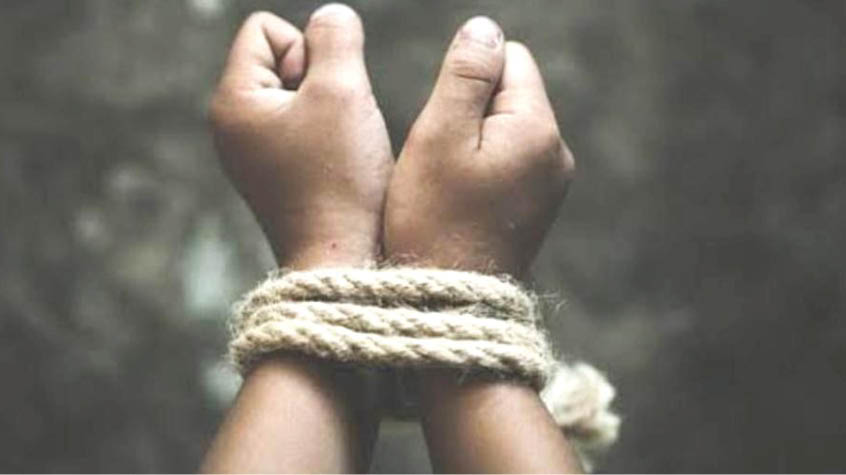Kidnappers operating in the Federal Capital Territory (FCT) are becoming more daring by the day as they have started collecting ransom from their victims via bank accounts contrary to their usual style of receiving cash, Daily Trust reports.
Last week alone, Daily Trust reported two kidnap operations by armed men on Tungan Maje community in the outskirts of the city. The marauders returned to the community, on Wednesday, after they had abducted 6 persons from the area a day earlier.
- Four cultists arrested in Edo, Lagos
- I intend to start a political revolution from Katsina – Sen. Yar’adua
Other FCT suburbs such as Kuje, Bwari and Abaji have experienced staggered spikes in incidences in the last few months.
While such kidnappers usually release their victims after collecting cash payments, a new trend suggests that they are devising new means of getting the ransom.
In April, a former Deputy Governor of the Central Bank of Nigeria (CBN), Kingsley Moghalu, alleged that terrorists and kidnappers had started making ransom demands in cryptocurrencies.
Though he was not specific of which particular groups of the criminals resort to such method, the ex-central banker said the new trend called for more regulation and governments’ attention on the cryptocurrency market around the world.
Some Nigerians have complained of how banks make it difficult to retrieve information about criminals who defraud unsuspecting members of the public using bank accounts.
Hamisu Ibrahim, an Abuja resident, recalled how ‘bureaucracies’ in the bank made him lose money to a criminal group after he was made to make payment.
A financial fraud expert, Umar Yakubu, said detecting criminals who follow formal financial systems is an easy thing to do, except if the will is lacking.
‘How kidnappers made us pay to bank’
Kidnappers on Wednesday, June 16, picked up their victims, Mrs Aminat Adewuyi and four others at Madalla junction when going on shopping to the popular Ibrahim Babangida Market in Suleja, Niger State.
Daily Trust reliably gathered that the victims’ relatives paid ransom money ranging between N500,000 and N1,000,000 to a designated bank account provided by the kidnappers before they secured their freedom.
A brother of Mrs Adewuyi, who did not want his name in print, said while negotiating with them the criminals initially demanded N5 million from each of their victims.
The kidnappers later agreed to collect N500,000 from Adewuyi’s relatives after two days and much pleas.
The negotiator said the criminals threatened to slaughter the woman if the ransom was not paid within 48 hours and insisted that they preferred collecting the ransom via bank than the usual cash.
The ransom payment slip, a copy of which was obtained by Daily Trust showed that Adewuyi’s husband paid N500,000 into an Access Bank account with number 1403762272 and the name Badawi Abba Enterprise.
Narrating her ordeal and how it happened to Daily Trust, Adewuyi said, “We boarded a bus at a junction opposite SARCO filling station, near the popular NYSC junction in Kubwa when going to Suleja Market.
“Majority of the passengers in the bus alighted at Zuba. The driver wanted to drop off the remaining few passengers also but he managed to take us to Madalla junction – the road that leads to Dakwa.
“But when we got to Madalla junction, the driver said we should board another vehicle going to Suleja. The remaining five of us (women) stopped a vehicle calling “Suleja! Suleja!!” and the bus driver settled him and we left.
“Immediately we entered, the driver ‘centrally locked’ all the doors and wound up all the windows. It was that time we knew that all the glasses were tinted. Four of us sat at the back seat, one sat together with a man in front including the driver.
“When they finished whining up the glasses, they brought out guns, knives and bottles of coke, saying we should cooperate. They ordered us to drink the coke mixed with codeine but I insisted I wouldn’t.
“The man in front raised a knife and gave me only codeine to drink but I pretended as if I had taken it. He could not do anything with his weapon because it was so tight in the vehicle.
“Some of the victims who took the coke had started sleeping before we reached the bush where they took us to.
“Despite the fact that I didn’t sleep, I can’t recognise where they took us to. I only know that the vehicle that conveyed us turned left immediately after Kwata (the popular place they are selling meat) before Suleja. Kwata is after Kwankwashe.
“Our vehicle drove into the bush and when it couldn’t go further, because the remaining road was a pathway, three persons that had already been waiting for them with bikes, conveyed us with their bikes into the deep bush.
“There was only one house in that bush. They kept us there and they were giving us bread and sachet water. One of us was released that same day because she had money in her account and transferred it to them immediately, we got there.
“They were already sharpening their knives to slaughter me after two days when they couldn’t get an alert from my husband. It was only God that saved me that day.”
Adewuyi’s husband, at the time, said he had formally reported the matter at the Anti-Kidnapping Unit of the Nigerian Police in Jabi.
When contacted, the Spokesperson for the FCT Police Command, ASP Mariam Yusuf, said the command has deployed overt and covert strategies to checkmate criminality within FCT including special Anti-Kidnapping operations.
Detecting kidnappers’ now political choices, expert says
In a telephone interview with our correspondent last night, a financial crimes expert and former staff of the Economic and Financial Crimes Commission (EFCC), Umar Yakubu, said a situation where kidnappers were not tracked down after collecting ransom through financial institutions, shows that detection of the criminals is now a political choice.
Yakubu, who is also the CEO of Counter Fraud Centre, said with such development, there won’t be an end to such criminality and it will continue to hurt the economy of the country.
He said, ‘’In all matters of crime and all manner of criminality, a major feature is stealth attempt to evade detection. That is why law enforcement agencies are established – to detect through investigation.
‘’But if we have a situation where criminals are demanding for ransom payment through financial institutions, where all customer due diligence records are supposed to be harboured, then there is a need for concern. It means they are not afraid of being detected.
‘’So, there is no need to waste resources on finding out who they are. They ought to be known. The government wants to open a war front it definitely cannot succeed. From examples in Mexico, Iraq, Afghanistan, India and other countries that have high incidences of kidnapping for ransom, there has never been a case of payment through bank accounts.
‘’The government needs to have a re-think because this action means a whole new ‘employment’ industry would be opened for further criminality’’
‘What govt is doing’
When contacted, officials of the Central Bank of Nigeria (CBN), did not formally respond to our enquiries on this.
However, a management source with the CBN said: “What the deposit money banks can do is to block or put a debit restriction on an account if requested by the account owner or on the instruction of the Nigerian Police or the Economic and Financial Crimes Commission backed by the court order.
“The Central Bank and the deposit money banks have always cooperated with law enforcement agencies making available credible information on a suspicious account leading to arrest of criminal activities in compliance with the Nigeria Financial Intelligence Unit (NFIU).
“Banks now have to monitor all funds flowing through them, alerting authorities to anything of interest—for instance, a transfer of funds to a high-risk country inconsistent with a customer’s history—to help uncover money laundering, terrorist financing or other crimes.”
The NFIU is the central national agency responsible for the receipt of disclosures from reporting organisations, the analysis of these disclosures and the production of intelligence for dissemination to competent authorities.
The NFIU is an autonomous unit, domiciled within the CBN and the central coordinating body for the country’s Anti-Money Laundering, Counter-Terrorist Financing and Counter-Proliferation Financing (AML/CFT/CPF) framework.
A spokesperson for the NFIU, Sani Tukur, referred our reporter to law enforcement agencies, saying the NFIU does not conduct investigations or arrest suspects.
But a senior official who craved anonymity said the agency is working on financial intelligence on kidnappers and bandits which it passes to law enforcement agencies for action.
He said the attention of the NFIU will now be turned fully on banditry and kidnapping as, according to him, they have muzzled Boko Haram and similar movements out of finances.
Bill criminalizing ransom payment on Senators’ table
Legislative action is ongoing on a bill that seeks to prohibit the payment and receipt of ransom for the release of any person kidnapped, imprisoned or wrongfully confined.
The Senate had on May 19, considered passed the Terrorism Prevention (Amendment) Bill, 2021, for second reading during plenary.
The Bill is sponsored by Senator Ezenwa Francis Onyewuchi (Imo East).
According to Onyewuchi, the bill essentially seeks to substitute for section 14 of the Principal Act and introduce a new section to read: “Anyone who transfers funds, makes payment or colludes with an abductor, kidnapper or terrorist to receive any ransom for the release of any person who has been wrongfully confined, imprisoned or kidnapped is guilty of a felony and is liable on conviction to a term of imprisonment of not less than 15 years.”
He said kidnapping has become a fast and lucrative business, adding that, “It has now remained the most virulent form of banditry in Nigeria and the most pervasive and intractable violent crime in the country.”
Attributing the spate of kidnappings in the country to factors such as corruption, unemployment, poverty and connivance of security agents, Onyewuchi lamented that the frequency at which persons are kidnapped daily puts most Nigerians at risk.
Citing a report compiled by the Financial Times and the USA Global Risk Consultancy in November 2019, the lawmaker noted that Nigeria has the highest rate of kidnaps for ransom of both locals and foreigners in all of Africa with kidnappers operating in each of its 36 states.
According to him, “The reason behind payments of ransom is rooted in the fact that people easily identify with individual suffering.
“However, history has shown that even where ransom is proven to have been paid, the life or safe return of a kidnap victim may not be guaranteed.”
He observed that countries like the USA and the United Kingdom do not support payment of ransoms to kidnappers.
“Payments of terrorist ransoms is illegal under the UK Terrorism Act 2000 while the USA adheres to a strict No-Concessions policy on the payment of ransom”, Onyewuchi pointed.

 Join Daily Trust WhatsApp Community For Quick Access To News and Happenings Around You.
Join Daily Trust WhatsApp Community For Quick Access To News and Happenings Around You.


